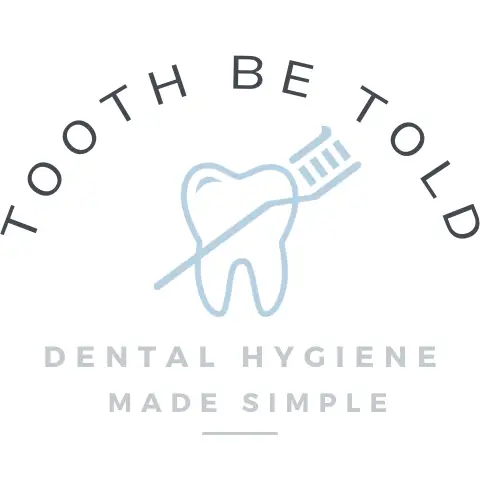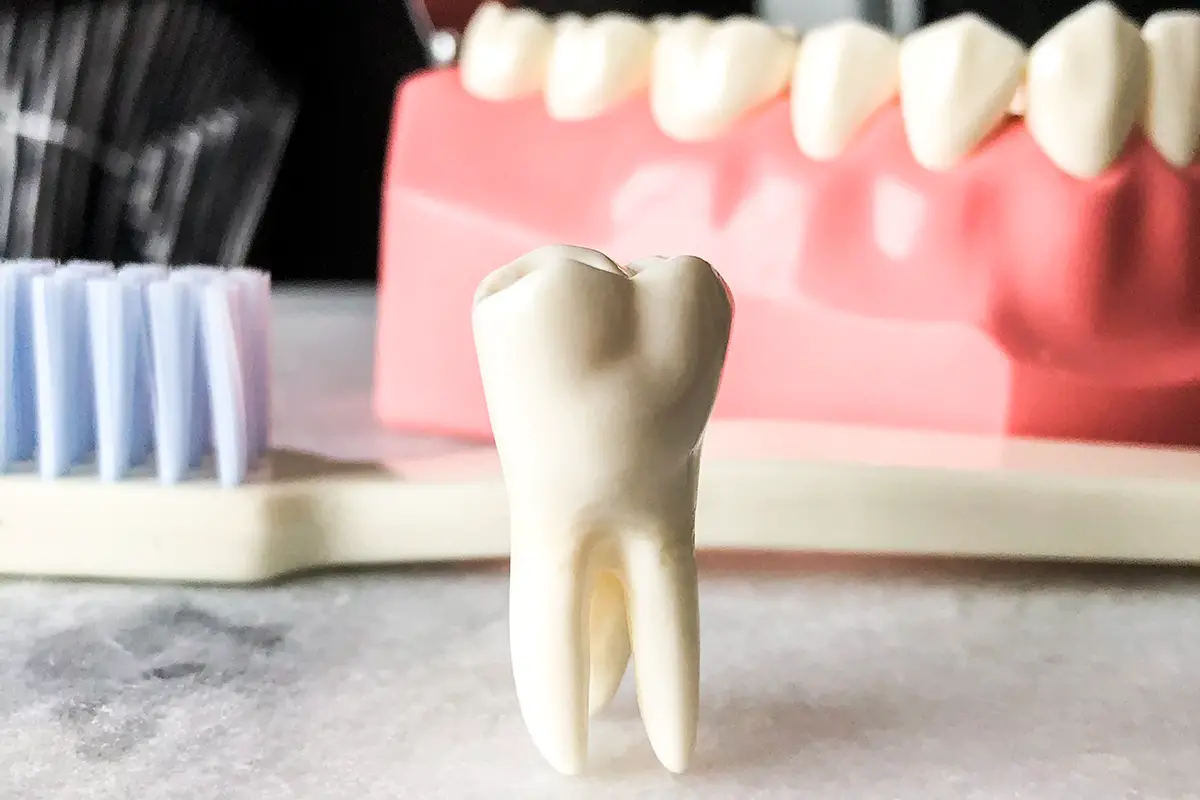
So your dental professional has recommended that you lose a little wisdom and get those teeth out at the back of your mouth. Or, you’re just a curious cat and want to know how it’s done.
Tooth extractions can be pretty straightforward or a little more difficult, depending on the situation.
A few steps are involved in the entire process of removing wisdom teeth that include both the dental professional and you, the patient.
What happens before wisdom teeth are removed
Consultation
If your dental professional has referred you to an oral surgeon, the first appointment with them will be a consultation.
The purpose of this appointment is to make you feel comfortable and make you aware of the wisdom tooth removal procedure.
They will also review your x-rays and discuss with you the risks of having them taken out and how the procedure will apply to your individual case.
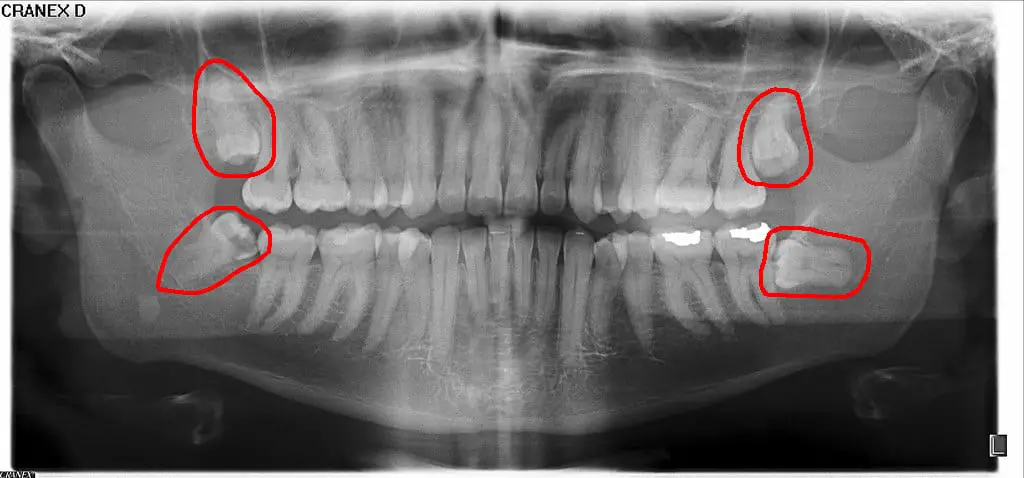
They will ask you if you have any questions related to the treatment, and they will answer them for you.
The oral surgeon will review what method of sedation is the best option for you.
Sedation
The options include; IV (intravenous) general anesthetic, nitrous oxide, otherwise known as “laughing gas”, medication to calm the nerves such as Ativan (lorazepam), and local anesthetic.
IV sedation can offer different levels of consciousness, from fully “asleep” to awake but less aware of the surroundings.
Even though some extractions can be fairly straightforward, sometimes fear and anxiety may prompt the person to have their treatment done under nitrous sedation or medication to calm the nerves.
If your wisdom teeth have fully erupted and there is little risk of complications, the doctor may just recommend a local anesthetic (this is done by a needle in the mouth). This means you will be awake and aware during the extraction.
How are the wisdom teeth are removed?
Ok, down to the nitty-gritty.
If you are under a deeper anesthetic, you will not remember this part.
If your wisdom teeth are impacted (surrounded by bone), the oral surgeon will first have to cut open the gum tissue in order to access the bone underneath. They will flap this tissue open like a butterfly so if they need to use stitches afterwards, they will have more tissue to work with.
Once the bone is exposed, they will drill it away until the tooth is revealed.
Sometimes the tooth has to be split or broken in order to take it out in pieces and cause the least amount of trauma to the extraction site. But often, it will come out whole.
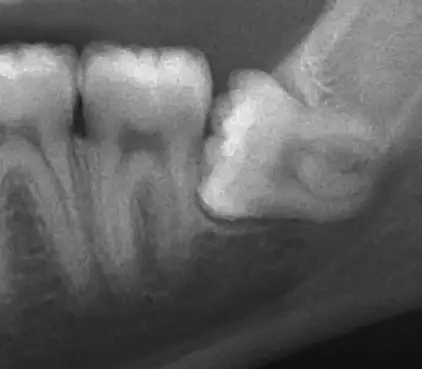
If your wisdom teeth have fully erupted, the dentist or oral surgeon will use a pair of forceps to pull out the teeth. Sometimes if it is difficult they will take a scalpel and cut the gums right around the tooth. Thousands of ligaments surround each tooth, holding it into the socket. Think of a trampoline. All of the springs are the ligaments holding the teeth in but allowing the tooth to have some minor movement for when we eat.
If stitches are needed, they are placed immediately after the extraction.
After the wisdom teeth are removed: steps to follow, aftercare
After the wisdom teeth are extracted, you will be set for recovery. Usually, at the oral surgeon’s, there will be a recovery room where you will “wake up”. You may still be groggy until you leave and probably for a little while after. You will need someone to take you to and from the appointment, staying at the office while the procedure is taking place.
Depending on the difficulty of the extractions, your recovery could be fast or slow. The initial recovery for the wound could be from one to a couple of weeks, but the bone takes a few months to fully heal underneath.
Read Now: 21 Best Vegan Foods to Eat After Having a Tooth Extracted
Aftercare guide post tooth extraction
Aftercare is crucial, and it has a serious impact on your oral health.
As soon as your tooth is extracted, a blood clot forms in the now empty space.
This blood clot protects the exposed bone and tissues and has cells that trigger new bone and blood tissue to form and help prevent infection.
Drinking through a straw and even smoking can dislodge the blood clot and must be avoided in the first 2-4 days after removal.
But not only can drinking through a straw cause disruption to the blood clot, so can drinking alcohol. Below is a post I wrote about drinking alcohol after wisdom teeth surgery including a timeline!
Read Now: Alcohol Use After Wisdom Tooth Surgery: A Professional Guide
When the blood clot is disrupted and dislodged, it is called a “dry socket,” and it can be extremely painful. This is because the bone is exposed to the open air along with some nerve tissue.
If this happens, you will need to notify the dentist or oral surgeon as soon as possible, as you could get a serious infection.
The blood clot holds the building blocks for a speedy recovery. As mentioned previously, there are cells that promote bone-building and blood tissue and will clear away bad bacteria.
You will not want to brush your teeth the same day as the extractions. Just leave it alone until the next day.
By day 2, you will want to start rinsing with saltwater. Put about 1/2 a teaspoon to 1 teaspoon salt in 1 cup of warm water. Stir until dissolved. You will want to take a mouthful and just hold it in and move your head gently from side to side. Do not aggressively swish your mouth as it could disrupt the blood clot.
Repeat the saltwater rinses 2-4 times a day, and try and time it for after you’ve eaten. The saltwater helps to reduce the bacteria in your mouth and promotes healing.
Read Now: Salt Water Mouth Rinse Recipe for Surgery, Ulcers, Infections
The 3rd day of recovery is the worst. It is the peak time for swelling and inflammation. The inflammation is one of the first steps in healing. This is because the more inflamed it is, the more blood that can reach the area.
The blood holds our body’s defence mechanism – white blood cells. The white blood cells will kill bad bacteria and take away the cells that are no longer needed. From there, your swelling will continue to go down as your body heals itself.
You will want to keep an ice pack on hand and use it against the area of swelling. It will help to keep the swelling down.
The oral surgeon will discuss what pain management is the best for you. Usually, it consists of alternating acetaminophen and ibuprofen. They will also go over the management of bleeding and gauze usage.
Diet recommendations
The diet that you should follow after having your wisdom teeth extracted (or any tooth) is pretty straightforward.
You will want to have soft foods that will break down easily.
In the first few days, you may find you have limited opening of your mouth due to the swelling.
I recommended treating yourself to your favourite ice cream or even Jello for a little bit of nostalgia (this brings me right back to my childhood).
Applesauce and thick smoothies (that you can eat with a spoon – remember not to use any straws as the suction can pull out the blood clot causing a dry socket) are a good option that tastes great too!
You will want to try and eat things with a good source of vitamins and minerals to help heal.
What to AVOID after wisdom teeth removal
Crunchy and crumbly foods. They can get stuck in the open wound following an extraction. Popcorn is the worst.
Avoid alcohol and caffeine because it will thin your blood, which could cause the clot to come out.
Do not spit aggressively; if you do need to get something out of your mouth, you will just want to lean over the sink and let gravity take over.
Read Now: How Long After Tooth Extraction Can I Use a Straw?
Avoid strenuous activities such as sports or hiking. Even some “gentle” activities such as walking up stairs can still cause your heart rate to go up, causing your blood flow to be more powerful, which could cause mild to heavy bleeding around the extraction site.
Again, do not use a straw or smoke cigarettes as the “sucking” pressure can also dislodge the blood clot.
If you think there may be something wrong, call your dental professional immediately for a consultation. They will make arrangements with you if they believe you need to be seen.
—
A big percentage of the population goes through orthodontic treatment to make their teeth straight and more functional. The issues with wisdom teeth are that they like to erupt between the ages of 16 to 21 after most people’s orthodontic treatment is complete.
Why would you go through the hard work of orthodontic treatment and have it affected by those silly wisdom teeth coming through?
A great video was put together by The American Association of Oral and Maxillofacial Surgeons outlining wisdom teeth removal.
The future is near
The amazing thing about the dental industry is how fast it evolves with new technology and advancements in care.
One thing that researchers think will come to light one day is to remove the wisdom tooth’s tooth bud before it starts to form and save it for a later time when the person loses another tooth.
Similar to cord blood from a baby’s umbilical cord, these teeth buds contain stem cells and can be used to grow a new tooth. They can grow the tooth in that tooth bud and re-plant it into the person’s jaw. You can read more about it here.
Why do some people not need their wisdom teeth out?
Risk of damaging surrounding tissues
Includes nerve, bone, and soft tissues that surround the wisdom teeth. The tissues may not heal properly, or you could have permanent numbness and damage.
Health issues
Some health issues can increase the risk of complications. Ex. dementia or cancer – when teeth are extracted, it leaves the body vulnerable to infection as the blood vessels are exposed, and harmful bacteria can invade the body.
Even medical complications such as diminished blood clotting due to medications or health conditions can cause too much bleeding and reduced clot formation.
Enough room
If the wisdom teeth can fully erupt into occlusion and be free of disease and decay and the person can keep them clean, the wisdom teeth don’t need to be taken out.
Most of the time, if all wisdom teeth erupt, they don’t have full function and don’t come together to help chew food, leaving them pretty much useless.
Supporting teeth
If the third molar is acting as a support for a bridge or other dental appliance, they will not remove it because it may reduce the function of the entire mouth.
Orthodontics
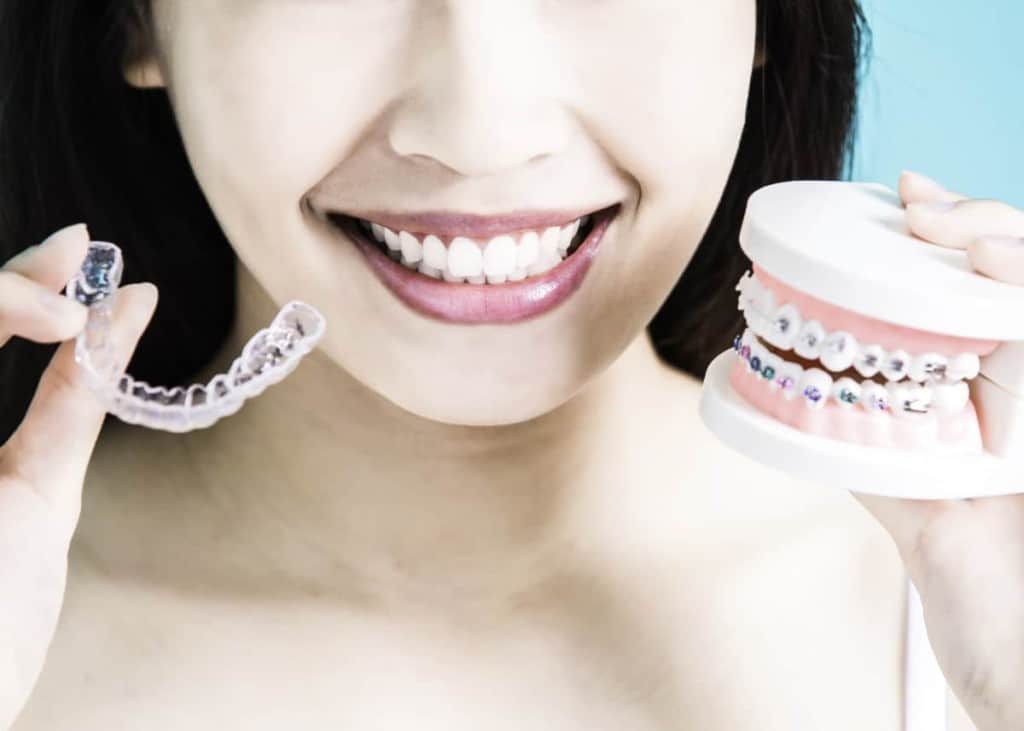
Because there is already so much going on in the mouth at that time, wisdom teeth extractions will usually be held off until after treatment or taken care of before. Unless absolutely necessary, the oral surgeon will wait.
Age
In patients over 30 years old with no symptoms or expressions of disease or issues, there is no need to take them out.
There is a time frame in life where there is a better time to have them extracted – the longer you wait, the more complications you can have. It is best to have them removed at the earliest time possible. This will be monitored by your dental professional.
It is best to take them out before the roots of the wisdom teeth have fully formed and solidified. The longer you wait, the more the roots have established themselves within the jaw and could’ve grown closer to the nerve.
This study discusses the relationship between increased age and bone removal and how it is associated with higher complications.
Patient choice
The patient doesn’t want them out. This could be due to fear, lack of money/dental insurance to pay for them to be extracted, or lack of knowledge.
It is important for me as a dental hygienist to discuss these risks with the patient and be honest about the potential risks and complications with both keeping them and extracting them.
All of these reasons can be found in this study.
I find once my patients understand and acknowledge all of this information, they are more willing to go ahead with the treatment.
My husband perfectly fits this scenario. He never had his wisdom teeth extracted and didn’t know the reasons why they should be. Once I explained and went over everything with him, his consultation with the oral surgeon was booked to get them taken out.
I hope that you have found this information useful and helpful in some way. My ultimate goal is to help people achieve a healthier smile and overall health.
Holly 🙂
Don’t miss it; My favourite oral hygiene products for adults.
